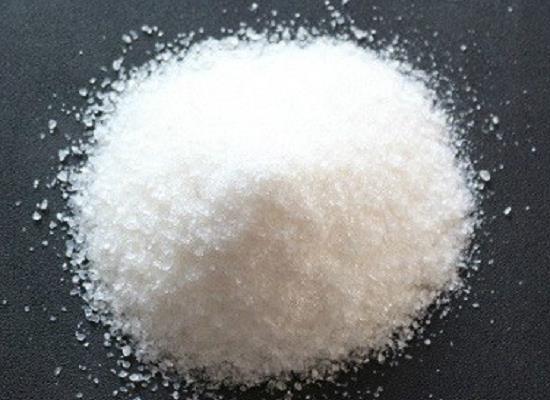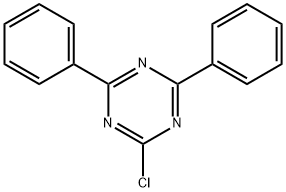2-Chloro-4,6-diphenyl-1,3,5-triazine: properties, applications and safety
General Description
2-Chloro-4,6-diphenyl-1,3,5-triazine is a white crystalline solid with moderate stability and solubility in organic solvents. It is commonly used as an electron acceptor and has applications in organic synthesis and electronic devices. It can be synthesized through condensation reactions and is used as an intermediate compound for the synthesis of pharmaceutical drugs and antibacterial polymers. It also has relevance in the field of chiral molecules. However, it poses safety concerns such as harmful effects if swallowed, skin and eye irritation, potential allergic reactions, respiratory irritation, and toxicity to aquatic life. Overall, it is a valuable compound with versatile applications but requires careful handling.

Figure 1. 2-Chloro-4,6-diphenyl-1,3,5-triazine
Properties
2-Chloro-4,6-diphenyl-1,3,5-triazine is a chemical compound with the molecular formula C5H6ClN3O2. It is a crystalline solid that appears as white in color. It is insoluble in water but soluble in organic solvents such as ethanol and acetone. It exhibits moderate stability under normal conditions, with a melting point range of approximately 138-140°C. It is relatively stable to air and light, although prolonged exposure to extreme temperatures or UV radiation can lead to degradation. In terms of reactivity, CDPT is commonly used as a strong electron acceptor or an electron transfer agent. It is widely utilized in the synthesis of various organic compounds and materials due to its ability to undergo nucleophilic substitution reactions. Additionally, CDPT demonstrates excellent electron-transporting properties, making it suitable for applications in organic electronic devices such as organic photovoltaic cells and field-effect transistors. In conclusion, 2-Chloro-4,6-diphenyl-1,3,5-triazine possesses distinct physical and chemical properties that contribute to its significance in organic synthesis and its potential use in electronic applications. 1
Applications
2-Chloro-4,6-diphenyl-1,3,5-triazine is a compound that has various applications in different fields. The compound can be synthesized through a preparation method involving condensation reactions using specific reagents. In the field of medical polymers, 2-Chloro-4,6-diphenyl-1,3,5-triazine can be used as an intermediate compound for the synthesis of teneligliptin, a pharmaceutical drug. The preparation method described in the text involves the reaction of compound 1 with compound 2 or its salt using a base and a condensing agent. The condensing agent used in this method is 4-(4,6-dimethylformaldehyde) oxytriazine-2-yl)-4-methylmorpholine hydrochloride (DMTMM). This method offers advantages such as cost-effectiveness, high reaction yield, and good reaction selectivity. The resulting compound I has high purity and can be used for industrial production. Additionally, 2-Chloro-4,6-diphenyl-1,3,5-triazine can be utilized in the preparation of bone cement containing N-halamine antibacterial polymers. By incorporating the compound into the polymer powder, the bone cement gains long-acting antibacterial properties. This helps address the issue of drug resistance caused by the use of antibiotics in clinical settings. The bone cement, consisting of the powder and liquid components, has a specific mass volume ratio and includes other necessary ingredients such as initiators and accelerators. This formulation can be applied in orthopedic procedures for joint and spinal repair, offering potential benefits in clinical applications. Furthermore, the compound has relevance in the field of chiral molecules. The invention introduces a water-soluble trident chiral molecule containing azobenzene pyridine. This molecule can be prepared using 2-Chloro-4,6-diphenyl-1,3,5-triazine as a key component. The resulting molecule possesses water solubility, stability, and convenient synthesis conditions. It serves as a valuable reference for the design and synthesis of other water-soluble trident chiral molecules containing azobenzene pyridine. Possible applications of this molecule include its use in the preparation of chiral self-assemblies. In summary, 2-Chloro-4,6-diphenyl-1,3,5-triazine has versatile applications ranging from pharmaceutical synthesis to medical polymers and chiral molecule research. Its properties and synthesis methods make it a valuable compound in these respective fields. 2,3,4
Safety
2-Chloro-4,6-diphenyl-1,3,5-triazine is a chemical compound with potential safety concerns. It is classified as harmful if swallowed, meaning ingestion can lead to adverse effects on health. The compound also has the ability to cause skin irritation, which may result in discomfort and inflammation upon contact. Additionally, it poses a risk of causing allergic skin reactions, potentially triggering an immune response in sensitive individuals. Furthermore, 2-Chloro-4,6-diphenyl-1,3,5-triazine has the capacity to cause serious eye damage and irritation. Direct contact with the eyes can lead to severe harm and prolonged discomfort. Moreover, the compound may induce respiratory irritation, particularly when inhaled in certain concentrations or environments. It is important to note that 2-Chloro-4,6-diphenyl-1,3,5-triazine is toxic to aquatic life and can have long-lasting effects on ecosystems. If released into water bodies, it can pose a significant threat to aquatic organisms and their habitats. In summary, 2-Chloro-4,6-diphenyl-1,3,5-triazine presents various safety concerns, including harmful effects if swallowed, skin and eye irritation, potential allergic reactions, respiratory irritation, and toxicity to aquatic life. 5
Reference
1. PubChem. COMPOUND SUMMARY: 2-Chloro-4,6-dimethoxy-1,3,5-triazine. National Library of Medicine, PubChem CID: 18450.
2. A kind of synthetic method of teneligliptin intermediate. National Center for Biotechnology Information, 2023, PubChem Patent Summary for CN-115160306-A.
3. A kind of bone cement containing N-halamine antibacterial polymer and its preparation method and application. National Center for Biotechnology Information, 2023, PubChem Patent Summary for CN-114452445-B.
4. Water-soluble trident chiral molecule containing azobenzene pyridine and preparation method and application thereof. National Center for Biotechnology Information, 2023, PubChem Patent Summary for CN-114075136-A.
5. 2-Chloro-4,6-dimethoxy-1,3,5-triazine. European Chemicals Agency, EC List no. 221-541-0.
Related articles And Qustion
Lastest Price from 2-chloro-4,6-diphenyl-1,3,5-triazine manufacturers

US $0.00/KG2025-04-21
- CAS:
- 3842-55-5
- Min. Order:
- 10g
- Purity:
- 99.5%
- Supply Ability:
- 5TONS

US $0.00/KG2025-04-15
- CAS:
- 3842-55-5
- Min. Order:
- 1KG
- Purity:
- 99%
- Supply Ability:
- 500000kg



